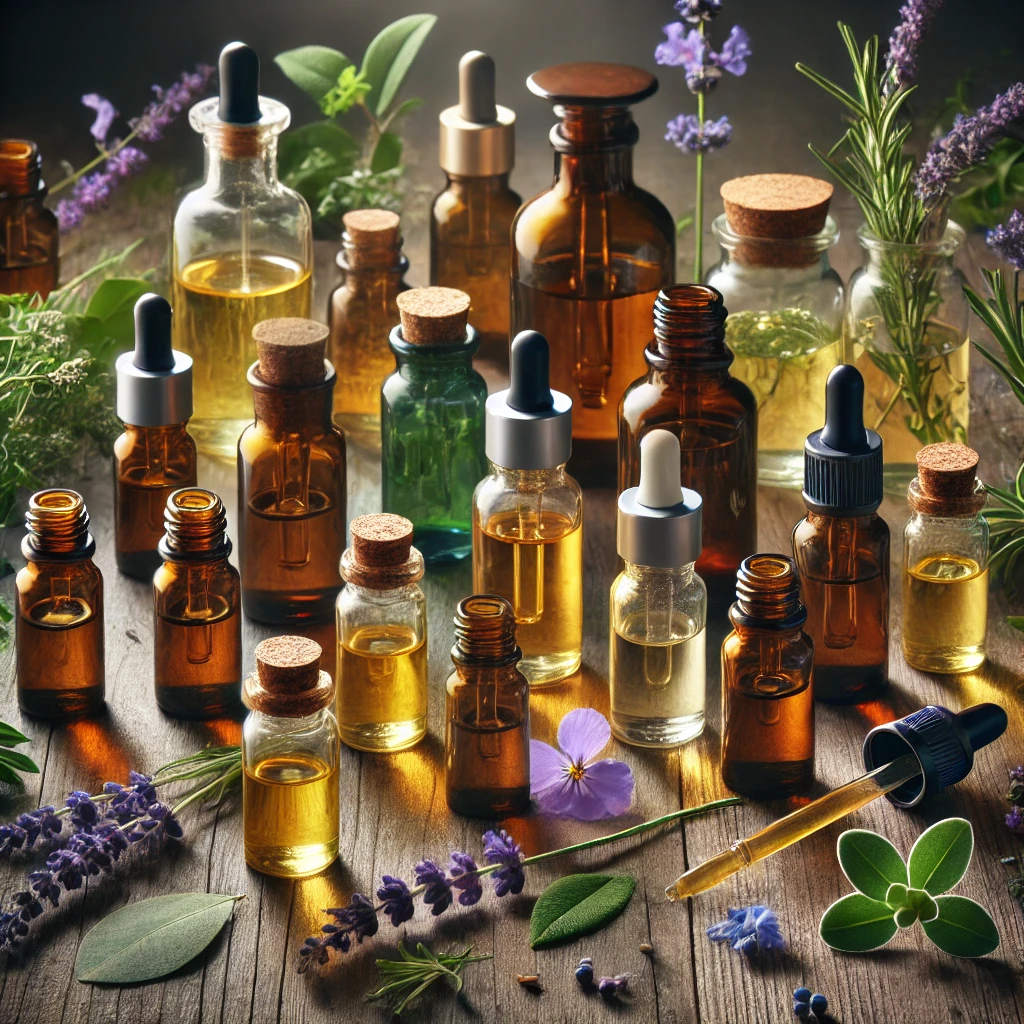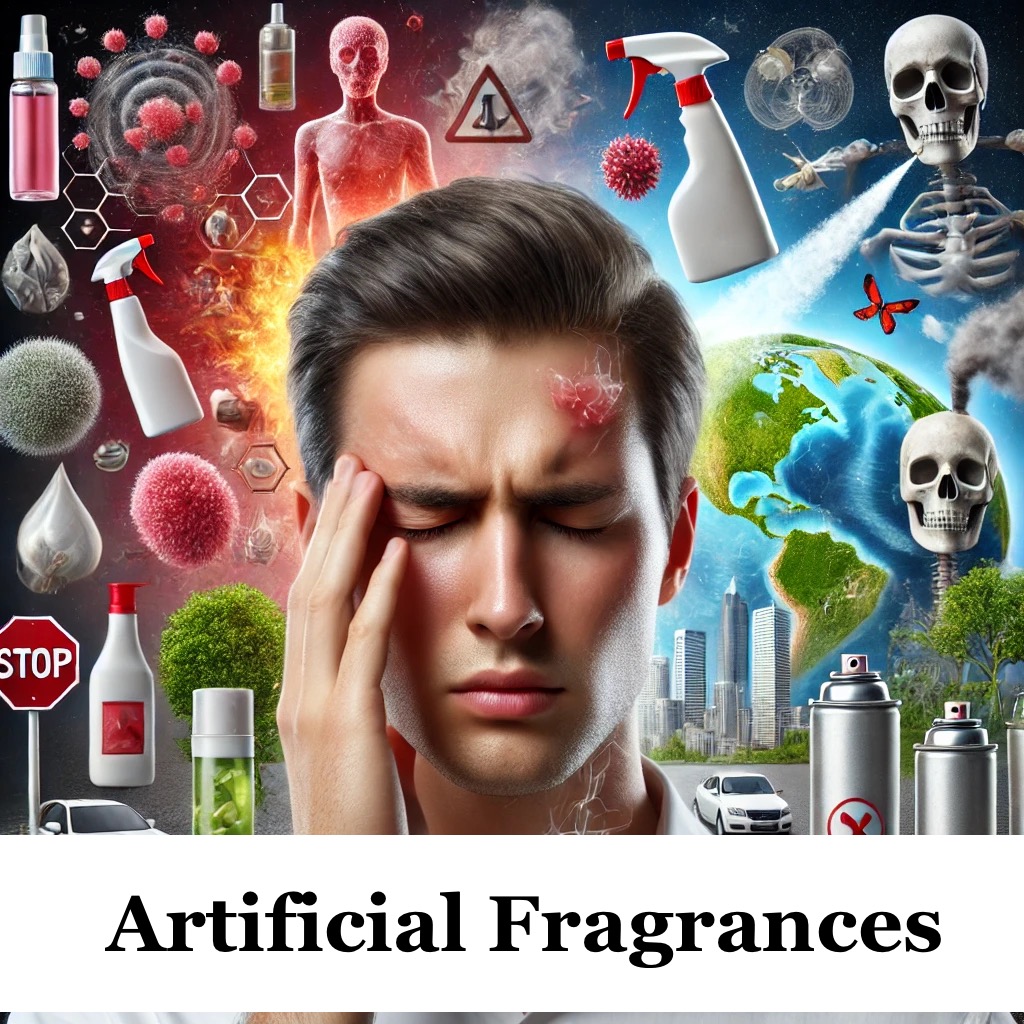Artificial fragrances are synthetic compounds designed to mimic the scents of natural substances. They are commonly used in a wide range of consumer products, including personal care products, cleaning agents, air fresheners, and cosmetics. Many synthetic chemicals in fragrances are petroleum-based and can be harmful to human health. Here are some examples of artificial fragrances commonly found in products:
- Phthalates: Phthalates are a group of chemicals used to enhance the scent of fragrances and increase their longevity often found in perfumes, colognes, deodorants, and scented lotions. Phthalates have been linked to potential health risks such as hormone disruption, reproductive issues, and respiratory problems.
- Parabens: Parabens are a group of preservatives commonly used in personal care products to prevent the growth of bacteria and mold. They are often found in fragrances, moisturizers, shampoos, and cosmetics. Parabens have been associated with potential health risks such as hormone disruption and breast cancer.
- Synthetic Musk: Synthetic musks are artificial compounds designed to replicate the scent of natural musk, which is derived from the musk gland of certain animals. They are commonly used in perfumes, colognes, and scented body products. Some synthetic musks, such as polycyclic musks and nitro musks, have been found to accumulate in the environment and may have negative effects on wildlife and aquatic ecosystems.
- Aldehydes: Aldehydes are a class of organic compounds used to add floral or fruity notes to fragrances. They are often found in perfumes, air fresheners, and scented candles. Some aldehydes, such as formaldehyde and acetaldehyde, have been classified as potential carcinogens and may cause respiratory irritation.
- Acetone: Acetone is a solvent commonly used in fragrances to dissolve other ingredients and enhance the scent’s longevity. It is often found in perfumes, colognes, and nail polish removers. Acetone can be irritating to the skin, eyes, and respiratory system, especially in high concentrations.
- Benzene derivatives: Benzene derivatives are aromatic compounds commonly used in fragrances to add a warm, sweet, or floral scent. They are often found in perfumes, colognes, and scented personal care products. Benzene derivatives can be irritating to the skin and respiratory system and may have long-term health effects with prolonged exposure.
These are just a few examples of artificial fragrances commonly used in consumer products. It’s important to note fragrance formulations are often considered trade secrets and may contain a mixture of chemicals, some of which may not be fully disclosed on product labels.
While artificial fragrances may enhance the sensory experience of products, they can pose risks to human health, environmental quality, and overall well-being. Artificial fragrances can be harmful to both human health and the environment for many reasons:
- Chemical Composition: As discussed, many artificial fragrances contain synthetic chemicals that can be irritating to the skin, eyes, and respiratory system. Some of these chemicals, such as phthalates, parabens, and synthetic musks, have been linked to adverse health effects including allergies, hormone disruption, and even cancer.
- Air Pollution: When artificial fragrances are released into the air, either through personal care products, household cleaners, or air fresheners, they can contribute to indoor air pollution. These volatile organic compounds (VOCs) can react with other chemicals in the air to form harmful pollutants like ozone and particulate matter, which can worsen indoor air quality and have negative effects on respiratory health.
- Environmental Impact: The production and disposal of artificial fragrances can have environmental consequences. The extraction of raw materials, as well as the manufacturing process, can contribute to pollution of air, water, and soil. Additionally, the packaging and transportation of fragrance products can further increase their carbon footprint.
- Endocrine Disruption: Some chemicals found in artificial fragrances, such as phthalates, have been identified as endocrine disruptors. These substances can interfere with the body’s hormonal systems, potentially leading to reproductive issues, developmental abnormalities, and other health problems.
- Allergies and Sensitivities: Artificial fragrances are a common trigger for allergies and sensitivities in many people. Fragrance ingredients are often complex mixtures of chemicals, and manufacturers are not required to disclose all of the ingredients used, making it difficult for consumers to identify and avoid potential allergens.
Artificial fragrances may provide pleasant scents, their potential health and environmental risks should be taken into consideration. Choosing fragrance-free or naturally scented products whenever possible can help reduce exposure to potentially harmful chemicals and minimize the negative impacts associated with artificial fragrances. Alternatives such as natural fragrances, like essential oils, or fragrance-free products are be preferable for those concerned about their impact.
Here are tips for avoiding harmful artificial fragrances:
- Read labels: Check product labels carefully and look for terms like “fragrance-free,” “unscented,” or “free of artificial fragrances.” Avoid products that list “fragrance” or “parfum” as ingredients, as these may contain a mixture of synthetic chemicals.
- Choose natural products: Look for products that are scented with natural essential oils or botanical extracts instead of synthetic fragrances. These products often have simpler ingredient lists and are less likely to contain harmful chemicals.
- Use fragrance-free alternatives: Opt for fragrance-free versions of personal care products, cleaning agents, laundry detergents, and air fresheners whenever possible. Many brands offer fragrance-free options for consumers with sensitivities or allergies.
- Make your own products: Consider making your own cleaning agents, personal care products, and air fresheners using natural ingredients like baking soda, vinegar, essential oils, and citrus fruits. There are many DIY recipes available online for making homemade products without artificial fragrances.
- Avoid air fresheners: Minimize the use of air fresheners, scented candles, and other fragrance-emitting products in your home or workspace. Instead, open windows for ventilation, use natural odor absorbers like baking soda or activated charcoal, and maintain a clean environment to reduce the need for artificial fragrances.
- Choose fragrance-free cosmetics: Select cosmetics and skincare products that are fragrance-free or labeled as suitable for sensitive skin. Fragrance-free options are available for various products, including moisturizers, sunscreen, makeup, and hair care products.
- Be cautious with scented products: Be mindful of scented products in public spaces, workplaces, and social settings. If you’re sensitive to fragrances, consider speaking up and asking others to refrain from using heavily scented products around you.
- Advocate for transparency: Support initiatives that advocate for greater transparency in labeling and ingredient disclosure for consumer products. Encourage companies to provide detailed information about the ingredients used in their fragrance formulations to help consumers make informed choices.
- Use Essential Oils: Essential oils, derived from natural plant sources, are often favored over artificial fragrances due to their potential therapeutic benefits and natural composition.
Benefits of Essential Oils:
- Aromatherapy and Emotional Well-being:
- Essential oils are widely used in aromatherapy to promote relaxation, reduce stress, improve mood, and enhance mental clarity. For example, lavender oil is known for its calming properties, while peppermint oil can help invigorate and improve focus.
- Natural Antimicrobial Properties:
- Many essential oils, such as tea tree oil and eucalyptus oil, have natural antimicrobial, antibacterial, and antifungal properties. They can be used to help clean and disinfect surfaces, as well as to treat minor cuts and skin infections.
- Support for Physical Health:
- Essential oils like eucalyptus or peppermint can help with respiratory issues when inhaled, while oils like ginger or peppermint are known for their digestive support. Some oils can also be used topically (diluted with a carrier oil) for pain relief and inflammation.
- Skin and Hair Care:
- Essential oils are often used in natural skincare and haircare products due to their nourishing and healing properties. For instance, tea tree oil is commonly used to treat acne, while rosemary oil is believed to promote hair growth.
- Natural and Chemical-Free:
- Essential oils are derived from natural sources without the synthetic chemicals found in many artificial fragrances. This makes them a preferred option for those seeking natural alternatives to synthetic products, particularly for individuals with sensitivities or allergies to chemicals.
Why Essential Oils May Be Better than Artificial Fragrances:
- Natural Composition:
- Essential oils are extracted from plants and contain natural compounds that provide their characteristic scents and therapeutic properties. Artificial fragrances, on the other hand, are made from synthetic chemicals that can mimic natural scents but may lack the therapeutic benefits.
- Potential Health Concerns with Artificial Fragrances:
- Artificial fragrances can contain a variety of chemicals, including phthalates and other potentially harmful substances, that may cause headaches, skin irritation, or respiratory issues in sensitive individuals. Essential oils, being natural, are generally considered safer, although they should still be used with care to avoid adverse reactions.
- Holistic Benefits:
- While artificial fragrances are designed primarily for scent, essential oils offer a broader range of holistic benefits, including mental, emotional, and physical support. This makes them more versatile in applications like aromatherapy, skincare, and wellness routines.
- Environmental Impact:
- The production of essential oils often involves sustainable practices and a lower environmental impact compared to the production of synthetic fragrances, which may involve petrochemicals and other non-renewable resources.
- Personalized Use:
- Essential oils can be blended to create custom scents and remedies tailored to individual needs, allowing for a more personalized approach to wellness. Artificial fragrances, in contrast, are typically mass-produced and lack this level of customization.
Cautions:
While essential oils offer many benefits, they should be used properly. Some oils can cause allergic reactions or skin sensitivity, especially if not diluted. Pregnant women, children, and people with certain medical conditions should consult with a healthcare provider before using essential oils.
Overall, essential oils are valued not only for their natural fragrance but also for their therapeutic properties, making them a popular choice for those seeking a more holistic approach to wellness.
Top brands of Essential Oils based on their quality, purity, and customer satisfaction:
This section includes affiliated links of highly rated essential oils on Amazon
- Plant Therapy: Known for offering a wide range of essential oils at a reasonable price, Plant Therapy is a favorite for both beginners and experienced users. Their oils are 100% pure, and they offer organic options as well. They also have a KidSafe line, making them a good choice for families.
- doTERRA: A premium brand that is highly regarded for its Certified Pure Therapeutic Grade (CPTG) oils. While a bit pricier due to its MLM business model, doTERRA’s products are consistently high quality, making them a solid choice for those seeking therapeutic benefits.
- Rocky Mountain Oils: Offers a broad selection of oils, including kid-friendly options and certified organic products. They are committed to sustainability and provide a 90-day return policy, making them a reliable choice.
- Edens Garden: This brand is well-regarded for its ethically sourced, GC/MS tested oils, with over 250 different oils and blends. They also allow customers to create custom sets, which can be a great way to explore different oils.
- Pura D’or: Specializes in USDA Organic certified essential oils and offers attractive, affordable kits. While they have a more limited selection, their products are ethically sourced and come with third-party certifications.

These brands are available on Amazon and are known for their high standards, making them a great starting point for anyone looking to incorporate essential oils into their routine.
By following these tips and being mindful of the products you use, you can reduce your exposure to harmful artificial fragrances and create a healthier environment for yourself and those around you.
DIFER.ORG is committed to reducing waste.





